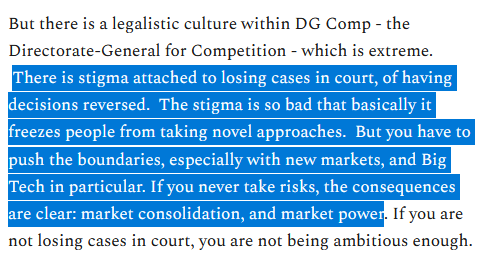
"Obviously Brussels is full of lobbyists, think tanks and people who never disclose that they are working for the companies. The gatekeepers are the law firms"
Interview with @TomValletti, former chief economist at the European Commission: thecounterbalance.substack.com/p/the-european…
Interview with @TomValletti, former chief economist at the European Commission: thecounterbalance.substack.com/p/the-european…
"The GAFAM (Google, Amazon, Facebook, Apple, Microsoft) have acquired more than 1,000 firms in the past 20 years, and zero of those transactions have been blocked - and 97 percent were not even assessed by anybody. These are extreme, ridiculous numbers"
"these think tanks, like the Global Antitrust Institute [at George Mason University], and the International Centre for Law & Economics, they are funded by the Koch brothers, by the Googles and the Facebooks, they don’t disclose, and they basically brainwash generations of judges"
At least, perhaps "concentration in Europe is not quite as bad as in the U.S. We have had more active regulators. We have made lots of mistakes, it’s been slow, it’s been late, maybe the remedies didn’t work out, but within the available laws Europe tried to achieve something"
"Especially in the first mandate of [European Commissioner for Competition Margrethe] Vestager, she had a mandate and the energy to do new things. The second mandate of Vestager hasn’t started with the same energy, I’d say."
• • •
Missing some Tweet in this thread? You can try to
force a refresh







